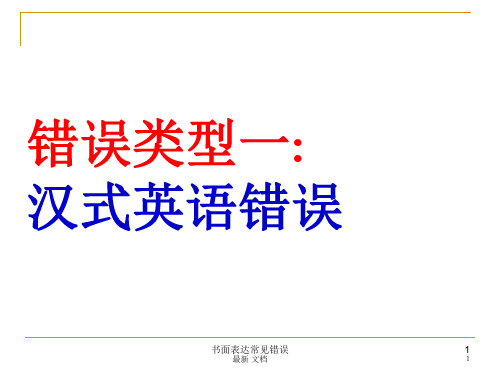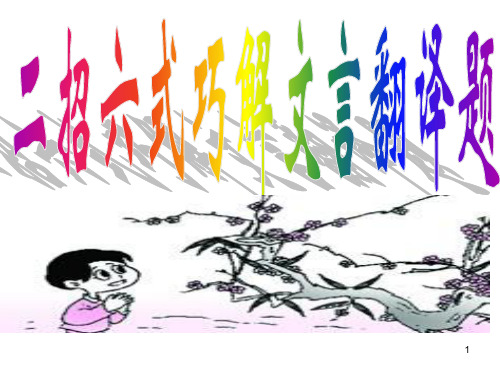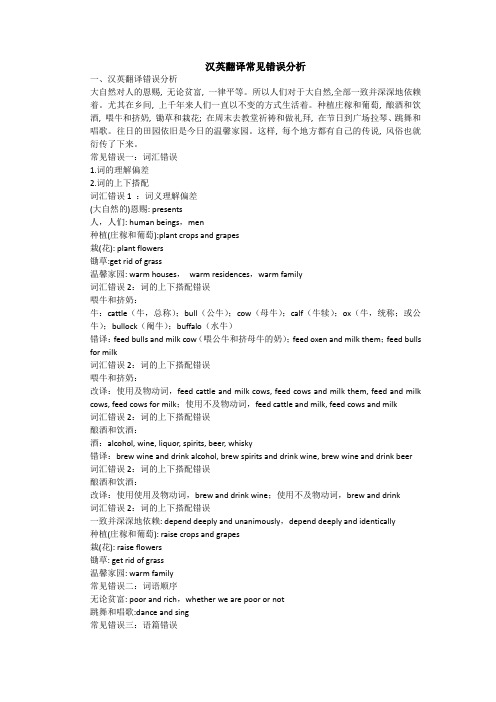汉译英常见错误例析优秀课件
复习课件书面表达常见错误.ppt

⒃误: His friends are few. 正:
He has few friends.
书面表达常见错误
10
最新 文档
10
⒄误: Wei Fang’s father scolded her coming late to school.
错误类型一: 汉式英语错误
书面表达常见错误
1
最新 文档
1
不少考生在英语书面表达时易受汉
语习惯影响,所写句子虽然语法正确,却 不符合英语表达习惯,造成不少汉语式 英语病句.要减少汉式病句必须做到: (1)养成用英语思维进行写作的习惯,注 意中西文化差异所带来的不同表达. (2) 平时多归纳总结,纠正汉式英语. (3)多
Twenty students in our class have been to Beijing.
2011-10-18
书面表达常见错误
7
最新 文档
7
⑾误: That factory broke out a fire last Sunday.
正: A fire broke out in that factory
⑷误:There is a notice in the park saying “ To take notice of safe; the sidewalk is very crafty.”
正:
There is a notice in the park saying “Watch your step. Slippery sidewalk.”
Without a friend one will feel lonely.
翻译误例分析PPT课件

3.该译的词没有译出来
• 以相如功大,拜为上卿
译成:以蔺相如的功劳大,拜他 为上卿。
6
4.词语翻译得不恰当
• 不爱珍器重宝肥饶之地。
译成:不爱惜珍珠宝器肥田沃土。
7
5.该删除的词语仍然保留
• 师道之不传也久矣。
译成:从师学习的风尚也已经很久 不存在了。
8
6.省略成分没有译出。
权以( 之 )示群下,莫不响 震失色。
的种类 和意译两种。
如 原文:项王、项伯东向坐;亚父南向坐,——亚父者,范
增也;沛公北向坐;张良西向侍。 直译 项王、项伯面向东坐着;亚父面向南坐着,—— 亚父是范增;沛公面向北坐着;张良面向西侍坐。
意译 项王、项伯坐在西面;亚父坐在北面,——亚父就 是范增;沛公坐在南面;张良陪同坐在东面。
从高考的特点与考查所要达到的目的出发,
译成:很多人在一起走,肯定有品 行高洁,学有专长,乐于助人并且 可以当我老师的人在里面。
11
9.应当译出的意思却遗漏了
• 子曰:“学而时习之,不亦 乐乎?”
译成:孔子说:“学习后要复习, 不也是很高兴的事吗?”
12
10.译句不符合现代汉语语法规则
• A.求人可使报秦者,未得。
判断正误: 寻找人可以出使回报秦国的,没 有找到。
1
文言文翻译的10种失误形式:
• 1.不需翻译的强行翻译
• 晋侯、秦伯围郑,以其无礼于晋
译成:晋国侯王和秦国霸主包围郑 国,因为郑国对晋国无礼。
2
第一部分
整体概述
THE FIRST PART OF THE OVERALL OVERVIEW, PLEASE SUMMARIZE THE CONTENT
第3篇第10章汉译英常见错误例析..

4) 动名词的逻辑主语问题 动名词的逻辑主语若与主句的主语不一致, 也属于语病。 例1.在挤公共车时,我的钱包丢了。 误:On squeezing on to the bus, my wallet was lost. 正:On squeezing on to the bus, I lost my wallet. 例2.未接到邀请他就参加了晚会。 误:He attended the party without inviting. 正:He attended the party without being invited.
例1.我能看出你的心事。 误:I can see your mind. 正:I can read your mind. 例2.从他的话音里,我能听出东西来。 误:I can hear something from the tone of his voice. 正:I can tell something from the tone of his voice.
5)不合乎逻辑的比较 不合乎逻辑的比较指在译成英语的句子中 形成了非等同物之间的比较。
例1.你们班的女生比我们班的更活跃。 误:The girls in your class are more active than our class. 正:The girls in your class are more active than those in our class. 说明:若不加those, 就变成了 girls和 our class比较。 例2.这里的气候像北京。 误:The climate here is like Beijing. 正:The climate here is like that of Beijing. 说明:若不加 that , 就变成了 climate和 Beijing比 较。
英汉互译典型错误分析(新)

Ⅱ. 搭配不当,言不及义
在英语名词和动词之间、名词和介词之间、动词和介词 或副词之间,以及某些句子成分之间等等,都可能存在着 某种习惯搭配关系,这往往不是一般的语法规则所能解释 清楚的,各种“搭配用法词典”也未必能够全部包括。事 实上,这个问题从一个侧面反映出英语语言博大精深的特 点,需要我们平时不断地注意学习、积累和提高。 英国翻译家纽马克曾指出:“外语翻译最容易出错的就 是搭配。”(The translator will be “caught” every time, not by his grammar, which is probably suspiciously “better” than an educated native‟s, not by his vocabulary, which may well be wider, but by his unacceptable or improbable collocations. )对英 语搭配关系熟悉,可以在很大程度上有助于对一些句子的 分析和理解,更有助于汉译英时正确使用英语。
现今180万温哥华居民中,有一半不是在本地出生的,每4 个居民中就有一个是亚洲人。25万华人对温哥华的经济转 型起着决定性的作用。 原译:Of the present 1.8 million residents in Vancouver, half are not native, and one in every four is an Asian. The 250,000 Chinese people have been playing a decisive role in the economic transformation of Vancouver. 改译:Of the present 1.8 million residents in Vancouver, half are not native, and one in every four is of Asian origin. The 250,000 Chinese Canadians have been playing a decisive role in the economic transformation of Vancouver.
小学教育ppt课件教案英语翻译中的常见错误

目录
introductionSpelling and usage errors of wordsGrammar structure errorInaccurate sentence structure expressionErrors caused by lack of cultural background knowledgeSummary and suggestions
单击此处添加正文,文字是您思想的提炼,为了最终呈现发布的良好效果,请尽量言简意赅的阐述观点;单击此处添加正文,文字是您思想的提炼,为了最终呈现发布的良好效果,请尽量言简意赅的阐述观点;单击此处添加正文,文字是您思想的提炼,为了最终呈现发布的良好效果,请尽量言简意赅的阐述观点;单击此处添加正文 10*16
Different cultural backgrounds in different regions can also have an impact on translation, such as geographical environment, climate conditions, ethnic distribution, etc. Lack of relevant background knowledge may lead to inaccurate or non authentic translation.
Different expression habits between Chinese and English: There are significant differences in expression habits between Chinese and English, such as the use of active voice in Chinese and passive voice in English; Chinese often uses concrete thinking, while English often uses abstract thinking.
汉英翻译常见错误分析

汉英翻译常见错误分析一、汉英翻译错误分析大自然对人的恩赐, 无论贫富, 一律平等。
所以人们对于大自然,全部一致并深深地依赖着。
尤其在乡间, 上千年来人们一直以不变的方式生活着。
种植庄稼和葡萄, 酿酒和饮酒, 喂牛和挤奶, 锄草和栽花; 在周末去教堂祈祷和做礼拜, 在节日到广场拉琴、跳舞和唱歌。
往日的田园依旧是今日的温馨家园。
这样, 每个地方都有自己的传说, 风俗也就衍传了下来。
常见错误一:词汇错误1.词的理解偏差2.词的上下搭配词汇错误1 :词义理解偏差(大自然的)恩赐: presents人,人们: human beings,men种植(庄稼和葡萄):plant crops and grapes栽(花): plant flowers锄草:get rid of grass温馨家园: warm houses,warm residences,warm family词汇错误2:词的上下搭配错误喂牛和挤奶:牛:cattle(牛,总称);bull(公牛);cow(母牛);calf(牛犊);ox(牛,统称;或公牛);bullock(阉牛);buffalo(水牛)错译:feed bulls and milk cow(喂公牛和挤母牛的奶);feed oxen and milk them;feed bulls for milk词汇错误2:词的上下搭配错误喂牛和挤奶:改译:使用及物动词,feed cattle and milk cows, feed cows and milk them, feed and milk cows, feed cows for milk;使用不及物动词,feed cattle and milk, feed cows and milk词汇错误2:词的上下搭配错误酿酒和饮酒:酒:alcohol, wine, liquor, spirits, beer, whisky错译:brew wine and drink alcohol, brew spirits and drink wine, brew wine and drink beer 词汇错误2:词的上下搭配错误酿酒和饮酒:改译:使用使用及物动词,brew and drink wine;使用不及物动词,brew and drink词汇错误2:词的上下搭配错误一致并深深地依赖: depend deeply and unanimously,depend deeply and identically种植(庄稼和葡萄): raise crops and grapes栽(花): raise flowers锄草: get rid of grass温馨家园: warm family常见错误二:词语顺序无论贫富: poor and rich,whether we are poor or not跳舞和唱歌:dance and sing常见错误三:语篇错误1.逐字翻译,画蛇添足2.重复不当,不合习惯3.断句不当,割裂语篇语篇错误1:逐字翻译,画蛇添足例1、在周末去教堂祈祷和做礼拜,在节日到广场拉琴、跳舞和唱歌。
《生活中的翻译辨误》PPT课件

精选ppt
3
His mother died of difficult labor.
他妈妈做苦工累死 了。 ×
他母亲劳累而死。 (hard labor) ×
他母亲死于难产。 √
Extend: first labor is often slow.(初产的过程比较慢)
人们会停止使用那个绿色的玩意。
×
要是使用数字货币变得如此容易, 人们会停止使用纸币(现金)
√
精选ppt
45
The Green Peace is also a supporter of alternative technology in power generation. 绿色和平也是发电替代技术的一
你偷了我的问题。 ×
我正要问你呢! √
精选ppt
10
The machine is in repair.
机器在修理中。 × (under repair)
机器维修得很好/ 状态很好。 √
精选ppt
11
She has an expensive taste in clothes.
她在衣服方面有一个费钱的爱好。 ×
我想赚些零用钱。 √
精选ppt
50
己的儿子有罪。 ×
法官的责任感战胜了父子私情, 他还是宣判(自己的)儿子有罪。
√
精选ppt
17
They didn’t praise him slightly.
他们一点儿也没有表扬他。 ×
他们大大地表扬了他。 √
精选ppt
18
That’s all I want to hear.
1-概述及翻译错误分析PPT课件

• The student has a tendency to stretch the truth.
.
21
• I like roast Beijing duck. • She is a sweet old duck. • Will a duck swim? • The young couple had a duck of boy. • Be a duck and help me with this. • Let’s duck in the bar for a drink.
• He threw us an apple of discord and we soon quarreled again.
• His Achilles’ heel was his pride—he would get very angry if anyone criticized his work.
.
4
Causes of mis-translating Polysemy
Eg. • After all my care in packing it, the
clock arrived broken.
• After the way he treated me I never want to see him again.
.
20
Euphemism
• Indeed in our country workers have no chance of industrial actions.
• Five percent of the graduating class are available for employment.
汉译英常见错误例析

4) 动名词的逻辑主语问题 动名词的逻辑主语若与主句的主语不一致, 也属于语病。 例1.在挤公共车时,我的钱包丢了。 误:On squeezing on to the bus, my wallet was lost. 正:On squeezing on to the bus, I lost my wallet. 例2.未接到邀请他就参加了晚会。 误:He attended the party without inviting. 正:He attended the party without being invited.
我可以占用你几分钟时间吗? Could I occupy some minutes of yours? 我们在树荫下乘凉。 We relaxed under the shadow of a tree.
造成汉译英常见错误的原因错综复杂,但 究其原因主要有两个:一是运用英语知识 的实践能力差,尽管道理和规则记得很熟, 但由于练习较少,动笔时就容易出错;二 是受汉语的影响,常见的错误往往是用英 语套用汉语的表达方式、习惯说法和思维 模式等。
例2.从山顶上看下去,这座城市就像个漂亮 的花园。 误:Seeing from the top of the hill, the city looks like a beautiful garden. 正:Seen from the top of the hill, the city looks like a beautiful garden. 例3.老虎在笼子里,因而我不怕。 误:Being in a cage, I was not afraid of it. 正:The tiger being in a cage, I was not afraid of it.
- 1、下载文档前请自行甄别文档内容的完整性,平台不提供额外的编辑、内容补充、找答案等附加服务。
- 2、"仅部分预览"的文档,不可在线预览部分如存在完整性等问题,可反馈申请退款(可完整预览的文档不适用该条件!)。
- 3、如文档侵犯您的权益,请联系客服反馈,我们会尽快为您处理(人工客服工作时间:9:00-18:30)。
例5。有空就到我们家来聊天吧。
误:If you are free, please come to our family to have a talk. 正:Drop in on us for a chat at any odd moment.
例6.我们的事业从胜利走向胜利。 误:Our cause has won victories one after
another. 正:We have won one victory after
another for our cause. 或译为被动语态:
A series of victories have been won for our cause.
说明:句中cause是没有生命的, 而win victories的主语一般是人, 二者用在一起,就把cause拟人化 了,而这种修饰方法在英文中被视 为毛病。原文虽在语法上没有错误, 但却不符合英语习惯用法,不是地 道的英语。
在用英语表达汉语原文的意思时, 时间的先与后,执行者与承受者之 间的关系,非谓语动词的逻辑主语 与主句的主语,比较句的排除与包 括,代替词和名词的性与数的一致 等等都存在着一个逻辑问题。许多 汉译英的错误都属于逻辑性错误。
A.时间的先与后不合乎逻辑, 例如:
例1.对不起,我没有看见你。 误:Sorry I don’t see you. 正:Sorry I didn’t see you.
汉译英常见错误例析
造成汉译英常见错误的原因错综复 杂,但究其原因主要有两个:一是 运用英语知识的实践能力差,尽管 道理和规则记得很熟,但由于练习 较少,动笔时容易出错;二是受汉 语的影响,常见的错误往往是用英 语套用汉语的表达方式、习惯说法 和思维模式等。
10.1 生搬硬套型错误
这类错误就是把汉语的表达 意思逐词照搬地直译成英语。
误:Warmly welcome all guests of honor at home and abroad to attend to this symposium!
正:Warm welcome to all honored guests both at home and abroad to attend the Trade Talks!
例3.我们改革开放的步子要迈得 更大一些。
误:Our steps of economic reform and open policy should be bigger.
正:Take a broader approach to economic reform and opening up.
例4.热烈欢迎国内外嘉宾参加贸易洽 谈会。
例1.为了在科研中取得成功,需要坚 持不懈。
误: To succeed in a scientific research, persistence is needed.
正:To succeed in a scientific research, one needsຫໍສະໝຸດ to be persistent.
正:It is a pity for him to be criticized.
说明:在例3、例4中,不定式的逻 辑主语是行为的承受者,故要改用 被动不定式。
A. 分词的逻辑主语问题
分词的逻辑主语必须与句中的 主语相一致,否则 便成为垂悬 分词,属于语病。如:
例1.看着窗外,他想起了自己 的童年。
例2.不要搞一刀切。
误: Do not cut off at one stroke.
正: Do not impose uniformity in all cases.
例2 原文是带有汉语特色的比喻说 法,意为“不可不顾实际情况,用 一切方法处理问题”。翻译时不可 拘泥于原文字句,“对号如座”。
说明:原译中不定式的逻辑主语与句子的主语不 一致,改译后句子用主动语态,增补one做主语
例2. 要做出决定,你应该考虑各 种因素。
误:To make a decision, everything must be taken into consideration.
正:To make a decision, you should take everything into consideration.
误:Looking out of the window, thoughts of his childhood came to him.
正:The book which had been borrowed from the library was found.
B. 不定式的逻辑主语问题
虽然不定式没有语法上的主语, 但有逻辑主语。不定的
逻辑主语与句子的主语要一致。不 定式的语态与逻辑主语有关。逻辑 主语是行为的执行者,要用主动不 定式;若逻辑主语是行为的承受者, 要用被动不定式,如:
例2.我不知道你在这儿。 误:I don’t know you are here. 正:I didn’t know you are here.
例3. 从图书馆借来的那本书已找到。 误:The book which was
borrowed from the library had been found.
例1.欢迎你参加英语角活动。 误:Welcome you to join our
English corner activities! 正:You are welcome to join
our English Corner!
(or: Welcome to join our English Corner!)
例3.这本书需要翻译成英语。 误:The book is required to put
into English. 正:The book is required to be
put into English.
例4.他挨了批评真是遗憾。
误:It is a pity for him to have criticized.
